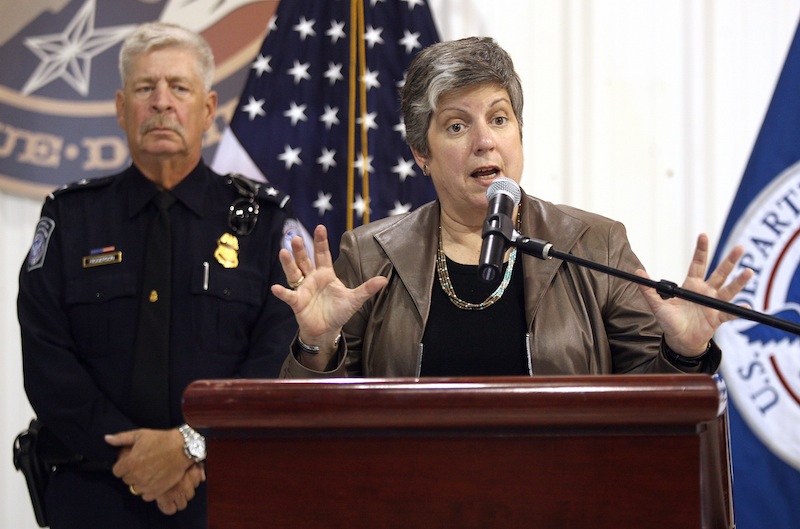America’s refugee policy, up until now one of the least discussed elements of immigration reform, is coming into the spotlight as lawmakers grapple with the aftermath of the Boston marathon bombing.
The two suspects in the case, Dzokhar Tsarnaev and Tamewrlan Tsarnaev, reportedly arrived in the United States as refugees when they were children, meaning there’s little chance a background check at that point could have caught anything potentially threatening in their past. But the broader system is still being brought up as a concern.
Refugee policy is not a major plank of the immigration bill, which does far more to overhaul the employment and family visa system and to adjust the status of existing undocumented immigrants. But it would add a few tweaks championed by human rights groups that would make it easier for certain immigrants to apply for asylum status.
At a Senate Judiciary Committee hearing on immigration reform legislation Tuesday, Sen. Chuck Grassley (R-IA) pressed Homeland Security Secretary Janet Napolitano over whether the refugee and asylum visa system was secure, adding he had heard concerns the bill “would weaken asylum law.” Other senators, including Sens. Dianne Feinstein (D-CA) and Dick Durbin (D-IL), one of the authors of the immigration bill, also asked Napolitano to elaborate on refugee and asylum procedures in light of the attack.
Earlier in the week, Sen. Rand Paul (R-KY) wrote a letter to Majority Leader Harry Reid (D-NV) calling for a review of the refugee system in addition to student visas.
“Our refugee programs have proven to be a problem,” Paul said. “On, January 29, 2013, two Iraqi citizens living in Bowling Green, in my home state of Kentucky, were sentenced to long prison terms for participating in terrorism and providing material support to terrorists while living in the United States. How did this happen? Does the current immigration reform address how this might have happened? We may need more scrutiny when accepting refugees from high-risk nations.”
About 150,000 refugees or asylum seekers were granted permanent residence in 2012, around 15 percent of total green cards issued that year. The number of refugees admitted to the country plummeted after the 9/11 attacks as officials revamped their security screening process out of terrorism fears, but has steadily ticked back up in recent years. Chechen applicants are extremely rare in the United States — the majority of recent refugees come from Bhutan, Iraq, and Burma.
The immigration bill under discussion would include some measures to make it easier to apply for asylum, including expanding the time applicants are eligible to claim they face a threat in their home country and giving officials more latitude to speed up the asylum process for applicants who appear to have a strong case.
Napolitano defended the current and proposed system alike at Tuesday’s hearing, saying that under the proposed bill “there are a number of times where individuals are checked and re-interviewed” by officials before being approved for refugee or asylum status. She added that security procedures have been bolstered in recent years.
“If someone is seeking asylum, they first have a screening interview to see whether they have presented any credible fear of persecution,” Napolitano said. “That includes biographic and biometric information. They submit to a full-scale interview. This could be several hours. It is usually accompanied by affidavits. One of the things we do is re-fingerprint the individual to make sure it’s the same individual. We vet and so forth. After a year, we can convert [to permanent resident] status. You are vetted once again.”
Mary Giovagnoli, director of the Immigration Policy Center and a former immigration adviser to the late Sen. Ted Kennedy (D-MA), told TPM that she saw nothing in the law that would affect the screening side of the process. She noted that procedures had been tightened significantly over the last decade already, especially in regards to “high risk” countries.
“The changes are not changes that implicate national security or have any connection to Boston,” she said.
The questioning was not necessarily been hostile. Sen. Patrick Leahy (D-VT) began a Monday hearing with an impassioned defense of refugees’ contributions to society, pointing to the nation’s large Vietnamese and Cuban communities, among others.
Members of the Senate “Gang of 8” who wrote the proposed bill under discussion at the hearing have signalled they may be open to strengthening background checks on refugees. Sen. Chuck Schumer (D-NY), while lighting into critics of his bill who would “exploit” the Boston attack to slow it down, has also suggested DHS procedures could come under review. Sen. Lindsey Graham (R-SC) told the New York Times this week that he might support an amendment to his bill requiring more thorough screening of refugees and asylum seekers’ from high risk countries.






